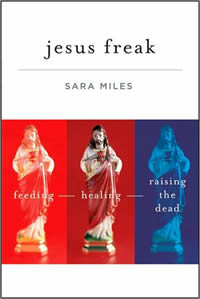Book Notes
 Sara Miles, Jesus Freak; Feeding, Healing, Raising the Dead (San Francisco: Jossey-Bass, 2010), 171pp.
Sara Miles, Jesus Freak; Feeding, Healing, Raising the Dead (San Francisco: Jossey-Bass, 2010), 171pp.
In her previous book Take This Bread (2007), Sara Miles described herself as a blue-state, secular intellectual, a lesbian, and a left-wing journalist who had developed habits of deep skepticism from covering revolutionary movements in Central America. Her grandparents on both sides were missionaries, but in reaction to that upbringing her parents were actively hostile to religion. She thus described herself as a "very unlikely convert" when at the age of forty-six she walked into Saint Gregory's Episcopal Church in San Francisco, partook of the Eucharist, and experienced a radical conversion. She had never heard a Gospel reading, never said the Lord's Prayer, and knew only one person who went to church.
That was about ten years ago. Today Miles is the founder and director of the Food Pantry, and Director of Ministry at Saint Gregory's. The food pantry that Miles founded back in 2000 was an explicit and intentional extension of the eucharist, and of the many places in the gospels where Jesus uses table fellowship and food as a sign of God's kingdom. Setting up food around the church altar, every Friday the pantry gives away free groceries (not meals) with no questions asked and no forms to fill out to about 800 families. The pantry is run by church volunteers, misfits, and oddballs who have benefited from the ministry. Another eighteen similar pantries have been jump-started as a result of Miles sharing her story both locally and nationally.
A Jesus freak, says Miles, is a person who lives as if you were Jesus, and were filled with his power, who takes his teachings literally, and who acts upon them in simple yet profound ways: "As the Father has sent me, so I send you" (John 20:21). The implication of the incarnation is that "a spiritual life is a physical life," as in feeding the hungry. Jesus freaks embrace outcasts instead of shunning them. They understand how outcasts are scape-goated in order to enable communities to define their center, clarify what's acceptable, and codify who's in and who's out. Jesus turned all this upside down by embracing all the wrong people — tax collectors, whores, the homeless, foreigners, and even dead bodies.
Miles' simple narrative packs a powerful punch as she tells the stories of the saints she's met through the Saint Gregory food pantry. This is not an air-brushed, Hallmark story. Rather, we meet the drug dealers and drunks, petty criminals, insane street people, troubled teenagers, pathological liars, expert manipulators, and scam artists — all the sorts of human beings that Jesus embraced, who present the face of Jesus to us every day, and who invite us to live "as if Jesus were real." Only in heaven, said Mother Theresa, will we understand how much we owe the poor for helping us to love God like we should.
I appreciated how Miles has moved beyond trying to determine which poor "really" need the food, how you keep people from cheating the system, why those poor people have cell phones and cars, what you do when people take advantage of you, and how to identify the so-called "deserving" poor. She's fully aware of her exaggerated sense of self-importance, of how we justify our own prejudices, idolize traditions, feel helpless and hopeless, and cherish our need to feel "effective." At the end of this book, you'll be painfully aware of the differences between a gospel that reinforces cultural conformity, convention and comfort, and one that takes the words of Jesus at face value and with a simplicity beyond all the complexities.
Note: This review is based upon an advance uncorrected proof from the publisher. Jesus Freak is scheduled for release in February 2010.


